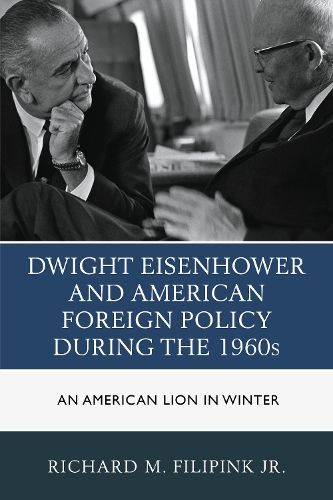Readings Newsletter
Become a Readings Member to make your shopping experience even easier.
Sign in or sign up for free!
You’re not far away from qualifying for FREE standard shipping within Australia
You’ve qualified for FREE standard shipping within Australia
The cart is loading…






Dwight Eisenhower had a measurable impact on the foreign policy decisions of his Democratic successors during the 1960s due to his reputation as a military and foreign policy expert as well as his continued popularity when and after he left office. Eisenhower sought to influence his successors’ policies for a number of reasons, including his underrated partisanship, his desire to protect the reputation of his administration, and his real concerns about the ability of his successors to successfully counter the communist challenge to American interests. Despite his steadily declining health, Eisenhower played both a public and behind-the-scenes role in shaping American foreign policy during the 1960s that had long-term consequences for the country.
This book traces the interactions between Eisenhower and his two successors from the pre-inaugural meetings with John F. Kennedy, their direct contacts on Cuba, the use of intermediaries such as John McCone and General Andrew Goodpaster, and the constant contact initiated by Lyndon B. Johnson. Through these direct and indirect contacts, Eisenhower constrained the choices available to Kennedy and Johnson and shaped the politics and policies of the United States until the final months of his life.
$9.00 standard shipping within Australia
FREE standard shipping within Australia for orders over $100.00
Express & International shipping calculated at checkout
Dwight Eisenhower had a measurable impact on the foreign policy decisions of his Democratic successors during the 1960s due to his reputation as a military and foreign policy expert as well as his continued popularity when and after he left office. Eisenhower sought to influence his successors’ policies for a number of reasons, including his underrated partisanship, his desire to protect the reputation of his administration, and his real concerns about the ability of his successors to successfully counter the communist challenge to American interests. Despite his steadily declining health, Eisenhower played both a public and behind-the-scenes role in shaping American foreign policy during the 1960s that had long-term consequences for the country.
This book traces the interactions between Eisenhower and his two successors from the pre-inaugural meetings with John F. Kennedy, their direct contacts on Cuba, the use of intermediaries such as John McCone and General Andrew Goodpaster, and the constant contact initiated by Lyndon B. Johnson. Through these direct and indirect contacts, Eisenhower constrained the choices available to Kennedy and Johnson and shaped the politics and policies of the United States until the final months of his life.